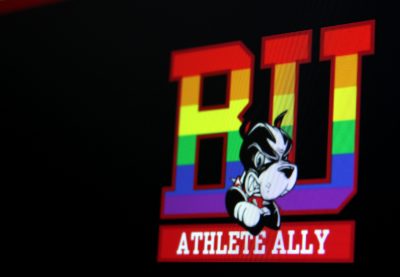When Diego de la Torre joined Boston University’s Athlete Ally chapter as a freshman, the group consisted of a handful of people, mostly members of the chapter’s executive board.
But this past year, Athlete Ally’s virtual meetings regularly drew 40 to 50 attendees, a boost in engagement de la Torre said the chapter had been working toward for the past three years.

De la Torre, now the chapter president, said he’s proud of how the group has grown on BU’s campus and become a community for student-athletes.
“To me, it means a lot to continue to create a welcoming environment, both similar to the one that I was welcomed into … and to make it even more welcoming and make everyone feel comfortable when they arrive at BU,” said de la Torre, who competes in cross country and track and field as a rising senior in the School of Hospitality Administration.
BU’s Athlete Ally chapter was founded in 2017. Entering its fifth year, the chapter has already achieved a crowning honor: a perfect score on the Athletic Equality Index, a report that the national Athlete Ally organization created to evaluate LGBTQ+ inclusion policies and practices at all Division I institutions.
The AEI scores athletic programs on eight criteria, including transgender inclusion policies, fan codes of conduct and LGBTQ inclusion training for staff and student-athletes.
“To create our current policies, a lot of discussion and hard work by our senior administration and Athlete Ally chapter needed to take place, and this is certainly a reward for that process,” said Drew Marrochello, BU’s director of athletics, quoted in an April press release. “Our department prides itself on our inclusive environment and we look forward to setting and reaching new goals within this realm in the future.”
BU is one of just 15 D1 schools to receive a perfect score of 100 on the 2020 AEI, which was released in full this June.
The Patriot League, BU’s primary athletic conference, received a score of 52.5 out of 100. According to the 2020 AEI, as of spring 2021, 92% of D1 institutions are not fully inclusive of trans athletes. And just 2.8% of D1 student-athletes compete for departments that fully protect and support LGBTQ identities.
Kristie Bowers, BU’s senior associate director of athletics, senior woman administrator, and the BU Athlete Ally chapter’s adviser, said the achievement was a result of combined efforts from student-athletes and staff.
“It was really rewarding for our student-athletes who have worked really hard to create an inclusive environment, especially in athletics,” said Bowers. “We’re incredibly fortunate to be at a school like BU that has the support, that has the administrative backing, that has all of those pieces in the puzzle where you’re not fighting.”
Athlete Ally scores institutions based on publicly accessible information and has changed the AEI metrics from year to year, so the BU Athlete Ally chapter’s work is far from done.
De la Torre said while he thinks BU has good policies, more education about LGBTQ policies in sports — especially those pertaining to trans athletes — will be important going forward. That and further increasing engagement within BU Athletics, he said, are at the top of the agenda for the 2021-22 academic year.
“A good thing that we’re going to work on is culture, but obviously you can’t force culture, you can just guide it,” De la Torre said. “Especially within athletics and the teams that we don’t really get to engage with us, we’d like to reach out to them and try to foster a better culture with them.”
Bowers said she is proud of the initiative of BU student-athletes in working to ensure that the athletics program is inclusive of LGBTQ+ athletes. BU’s safe and supportive environment, she said, empowers both student-athletes and staff to live authentically and be at their best.
“I think that’s a part of who we want our students to be,” Bowers said. “To feel safe and feel supported, and allow them to be authentic so that they can achieve great things in the classroom, in their sport and then in life.”














































































































